WL Central will be updating news on Algeria, with new items added at the top. You can contact me on twitter @kgosztola or by email at kgosztola@hotmail.com.
Current time and date in Algeria:
SATURDAY, February 26
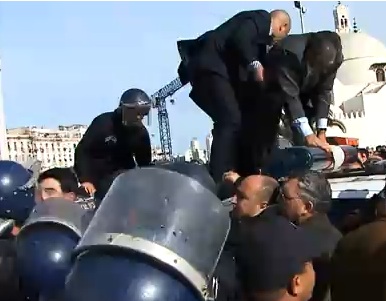 3:55 PM
3:55 PM
El Watan live blogged the action in Algeria as police prevented a protest from taking place in Place des Martyrs. The NCCD tried to hold the protest.
The post describes how police swarmed the streets and occupied sidewalks and pedestrian spaces in the capital of Algiers. Said Saadi and other protesters showed up to begin the action and police divided a forming group into two smaller groups. Said Saadi tried to get up on a police vehicle and go talk to some of the protesters and the police brought him down violently.
Protesters on Che Guevera boulevard began to hold an action only to be dispersed by security forces.
At 12:00, the area was still filled with police. There were tiny pockets of protesters in the area carrying portraits of Bouteflika demanding his resignation but the police effectively prevented anything from taking place.
Here is what appears to be video from the February 26 action that was broken up by police:
Herald Globe has this report, which seems to misrepresent what has taken place today. It suggests the protests by demonstrators were allowed to happen today and not diffused because the State of Emergency law was lifted. But, if the above video and El Watan are any indication. security was tight and did everything to make sure a large protest didn't happen.
Also, there are reports of Algerian mercenaries being a part of the many mercenaries Gaddafi has hired to gun down protesters and suppress the revolution Here is a report on African mercenaries in Libya right now from the Moroccan news agency.
THURSDAY, February 24
Not much in the way of protest news to report so, instead, here's some news on how Algerians are handling the situation in the neighboring country of Libya right now:
2:18 PM Supreme Council of Egyptian armed forces is working with Algerian authorities to get Egyptians who are stranded on the part of Libya on the southeastern border of Algeria out
Algerian intellectuals have come out strongly against crimes Gaddafi is committing against his people. This group denounced the mass killing the Gaddafi regime is perpetrating right now against those who are defenseless in Libya. The group also strongly condemned the silence of Arab countries and the international community. They called upon the Arab world and world governments to help stop the slaughter and do something to help the Libyan people.
Al Jazeera report on mercenaries in Libya from an Algerian Algerian returning home from Libya speak to Al Jazeera. One man who was in Tripoli tells us, as foreigners, they were targeted: "It was crazy. It did not make sense. There were so many mercenaries shooting at people." The Al Jazeera reporter asked if he saw mercenaries with his own eyes. He said: "Yes, I did. They entered houses - but even the Libyans used violence against the foreigners - Moroccans, Tunisian, all Arabs - under the pretext they were against the regime."
And, here's more news on an investigation launched in the country into attacks on students: General Hamel has reportedly expedited an investigation on violence committed by riot police against high school students waging a sit-in in front of the headquarters of the Ministry of Higher Education and Scientific Research last Monday. The investigation results appear to still be in the process of verification, but the government appears to want the people of Algeria to think they are taking this incident of violence seriously.
Posted by Vatyma
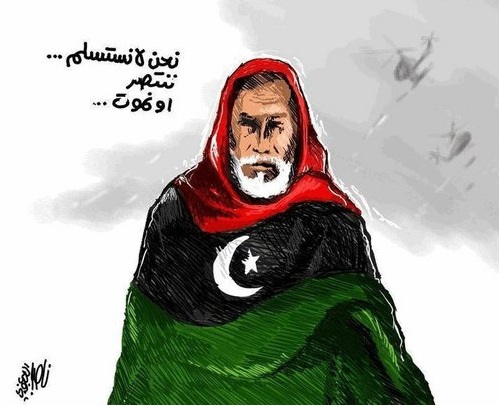
WEDNESDAY, February 23
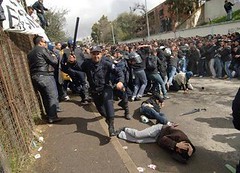 1:55 PM El Khabar with this report on protesters demanding Bouteflika intervene to protect Libyans In front of the Libya Embassy in Algeria, they called on the president to take a firm stand on the massacres being committed by Gaddafi on the people of Libya.
1:55 PM El Khabar with this report on protesters demanding Bouteflika intervene to protect Libyans In front of the Libya Embassy in Algeria, they called on the president to take a firm stand on the massacres being committed by Gaddafi on the people of Libya.
Al Bawaba reports on the strikes that are crippling Algeria sectors like health and justice Report says “important decisions” to help “facilitate young people’s access to bank loans and create jobs” were to be taken February 22. But, more importantly, it talks about how municipal workers have entered an open-ended strike that began two days ago, which demands “issuance of their own basic law, to enable them to benefit from increase in wages.” Highlights the students of the University of Boumerdes who have been leading one of the biggest strikes in Algeria right now.
Algerian authorities according to Al Bawaba, are investigating “assault elements of riot police on the university students” who staged protest in front of Ministry of Higher Education headquarters in Algiers on TuesdayIt adds:
“The Algerian security official that the investigation will reveal the circumstances of this case and in the event of evidence that the charges will be taken strict sanctions against members of the police.
The Director-General for National Security in Algeria, Colonel Abdul Ghani Hamil issued orders to police and riot not to deal with by force and violence any of the sit-ins and social protests taking place in Algeria.
Euronews report with video on students defying bans on protest and holding demonstrations anyway
AFP coverage of Algeria finally moving to lift 19-year old emergency law
AFP on “protest strikes” hampering Algeria Reports that court clerks continue to strike and covers an instance where seven unemployed people “staged a protest on the roof of an administration building” in northeastern Annaba and “mutilated themselves.” One “slashed his torso.” He lost consciousness and was taken to hospital.
SATURDAY, February 19
ElKhabar.com reports on the President of the Algerian National Front, Moussa Touati, calling for for Algerian leaders to implement what he calls a peaceful uprising for change. In a press conference he says that authorities want to invoke acts of sabotage and riots to prevent marches and demonstrations. He says those who march and demonstrate do not practice sabotage. He criticizes Algerian regime practices, “What did these rulers since 1962 till today for the Algerians, there is a contempt and the confiscation of opinion gag… We are in a monarchy, and even the proportion of the elections did not exceed 34 percent.”
Echorouk Online with a report on the police in Algeria today preventing protests:
arge numbers of police were mobilized Saturday at the main entrances or arteries leading to the Concorde Square to prevent the march staged by the National Coordination for Change and Democracy (CNCD).
Between 200 and 500 protestors gathered at the Concorde Square and Mohamed-Belouizdad Street. One of the demonstration's organizers told reporters that "the large number of police dissuaded people from joining the march."
Algerian police in riot gear have used batons to break up a crowd of about 50 opposition supporters trying to take part in a protest march inspired by uprisings elsewhere in the Arab world.Police brandishing clubs, but no firearms, weaved their way through the crowd in central Algiers on Saturday, banging their shields, tackling some protesters and keeping traffic flowing through the planned march route.
The gathering, organised by the Co-ordination for Democratic Change in Algeria (CNCD), comes a week after a similar protest, which organisers said brought an estimated 10,000 people and up to 26,000 riot police onto the streets of the capital. Officials, however, put turnout at the previous rally at 1,500.
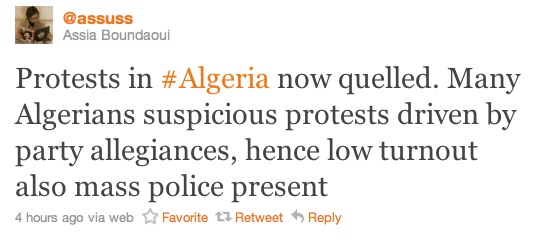
Video shot by of the protests today
BBC reports on the police breaking up the protests. In addition to the Echorouk Online post, the report says, “One opposition leader was injured after being hit by officers.” The protesters again were calling for better living conditions and greater freedom. The main opposition parties mainly stayed out of the protests.
Anti-government protest demonstrations broken up by police (video)
Photos from Envoyés Spéciaux Algériens
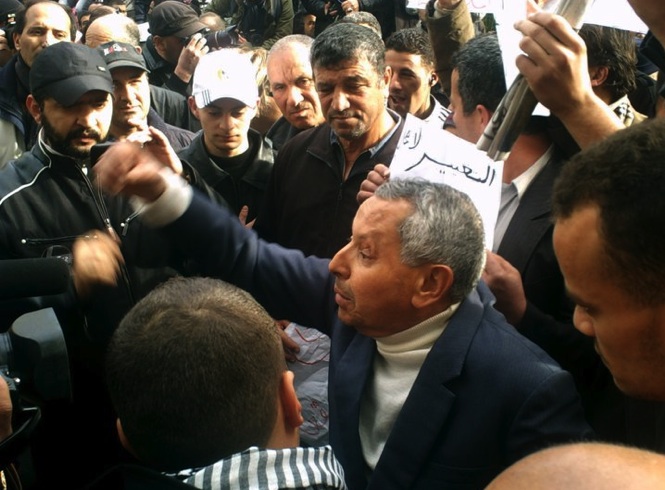
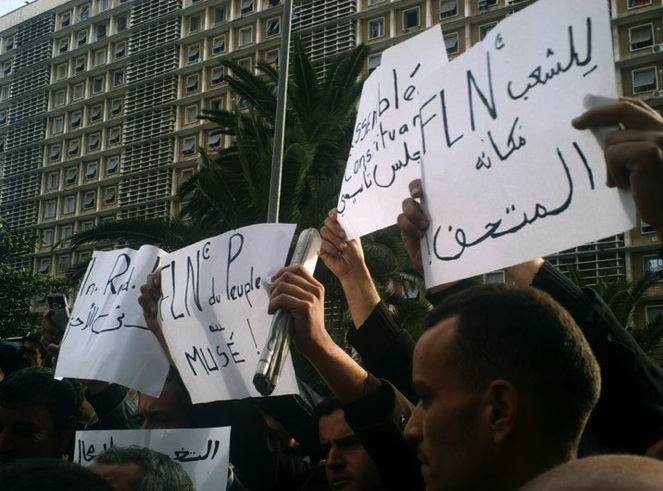
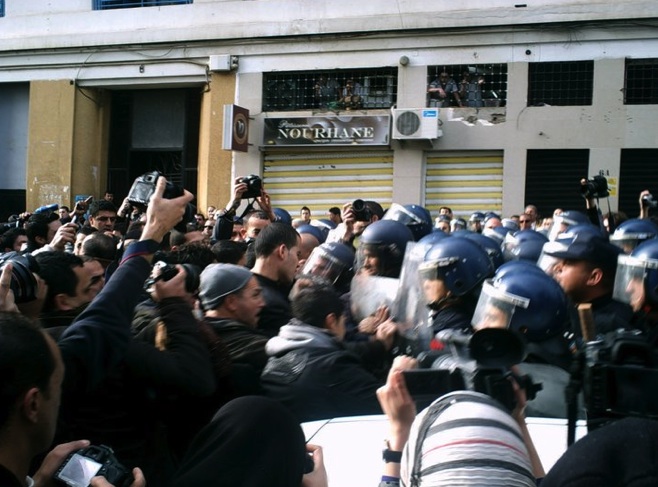
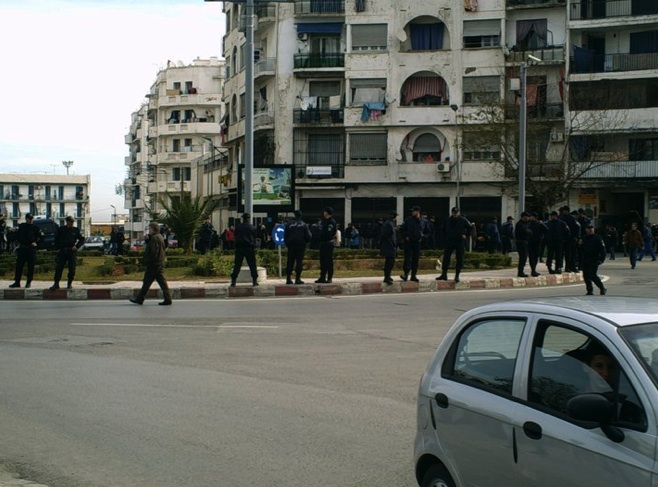
THURSDAY, February 17
Afrol.com covers the role students are playing in keeping the Algeria protests alive:
Since the Saturday anti-government protests in Algiers, which was brutally dispersed by a large number of police troops, the pro-democracy movement mostly has staid off the streets, rather concentrating on setting up a nation-wide organisation to head the protests each Saturday.
But meanwhile, the student protests are going on, spreading and reaching new heights. All over the country and during the entire week, university students have organised strikes, sit-ins and manifestations.
Ten days ago, some 500 students at the University of Algiers started boycotting classes. More student joined in a protest march the day after as an "indefinite strike" was declared. Then, students in thecites of Oran, Tlemcen and Annaba followed up with strikes and manifestations.
This week, the more politicised students have even widened their action. In the city of M'sila, the "indefinite" student strike was announced on Monday. Yesterday, an estimated 15,000 students took to the streets of M'sila, mostly shouting slogans against Algeria's education policies. The protests were peaceful.
Mohamed Chafik Mesbah, a political scientist and a former senior officer of the National Popular Army, with this analysis of what is happening and what could happen in Algeria. Mesbah also highlights the U.S. interest in what is happening and what they will or will not support -- what's at stake.
The interview posted by TSA Algerie is in French. Here is an excerpt translated to English:
Tunisia and Egypt have recently been shaken by a popular movement that led to impressive changes at the head of these two countries. What similarities and what differences from Algeria?
First, the similarities. In three macro-political, macro-economic and macro-social characteristics of Arab societies are quite similar. In political terms, are authoritarian regimes and when resources permit, states are pensioners. Economically, it is the chronic underdevelopment of the economies structurally deficient. Socially, it is social insecurity with a wide gap between a minority of owners facing a huge poor population, or almost destitute. It is the common lot of all three countries with nuances that reflect the context specific to each house. That is the substance of things, a reality that has not escaped the UNDP experts who, on a recurring basis in recent years have repeatedly drawn attention to the chronic crisis that hits the world Arabic.
What differences then?
The mode of operation regimes in Tunisia and Egypt, where the scheme is based on the omnipotence of the police. This is not the case in Algeria, where the role of the police is reduced. The weight of the military institution, important in Egypt and Algeria, Tunisia is minimal. The weight of demographics, heavy in Egypt - 80 million people - and in Algeria - 35 million - is low in Tunisia, less than ten million. The diffusion of the Internet and extended social networks in Tunisia and Egypt remains limited in Algeria. The illiteracy rate is lower in Algeria than it is in Tunisia and Egypt. Algeria, unlike Tunisia and Egypt, has finally, a mass of funding that governments can use to defuse every time, social protest. These differences may help to delay the protest movement, not to the curb for good.
At The Indypendent John Tarleton asks if it's Algeria's turn:
Algeria is the world’s fourth largest exporter of natural gas and the eighth largest exporter of oil at 1.9 million barrels per day. Yet, this resource-rich nation of 35 million people is plagued by large income disparities, high youth unemployment, poor housing and a sclerotic political system that has produced a series of military-backed strongmen who have led the country since it won its independence from France in 1962.
Thanks to these powder-keg conditions, Algeria’s current dictator, Abdelaziz Bouteflika, is on the short list of Arab despots who could next be ousted from power by their own people. Algeria briefly experimented with multi-party democracy and an independent press in the late 1980s following massive demonstrations against IMF-mandated austerity measures. This political opening abruptly ended in 1992 when the military cancelled elections that an Islamist party was on the verge of sweeping and declared a state of emergency that continues to this day. The 10-year civil war that followed pitted the government against several Islamic insurgent groups, leaving as many as 200,000 dead...
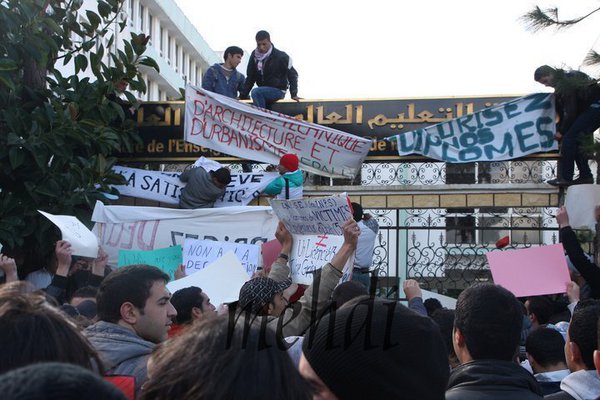
WEDNESDAY, February 16
Ordinary Algerians are wary of any relapse into political turmoil after a political opening in the early 1990s degenerated into a brutal conflict between security forces and Islamist militants that killed an estimated 200,000 people. "Algeria effectively already had its revolution," said Geoff Porter, an independent U.S. analyst on North Africa. "Few want to risk descending into another decade of chaos."
Even if mass unrest breaks out, most analysts believe the risk of disruption to oil and gas exports is minimal. Nearly all the energy activity is deep in the Sahara desert and the biggest oilfield town, Hassi Messaoud, is relatively well-off and heavily policed. Since the conflict with Islamist rebels started, there have been no confirmed cases of energy infrastructure being hit.
…Just as Mubarak forged close ties with the U.S. — and was rewarded with billions of dollars in U.S. military aid — so too has Bouteflika cultivated relationships with European and American officials by waging a battle against Islamic militants and arguing that Algerian-based terrorist groups would be far more dangerous in his absence. The terrorism threat is real enough. Al-Qaeda's North African offshoot, al-Qaeda in the Islamic Maghreb (AQIM), was founded in Algeria in 2007 as an outgrowth of the Salafist Group for Preaching and Combat, which has long fought against Bouteflika's secular policies. AQIM has kidnapped numerous foreigners around the region…
Theme by Danetsoft and Danang Probo Sayekti inspired by Maksimer